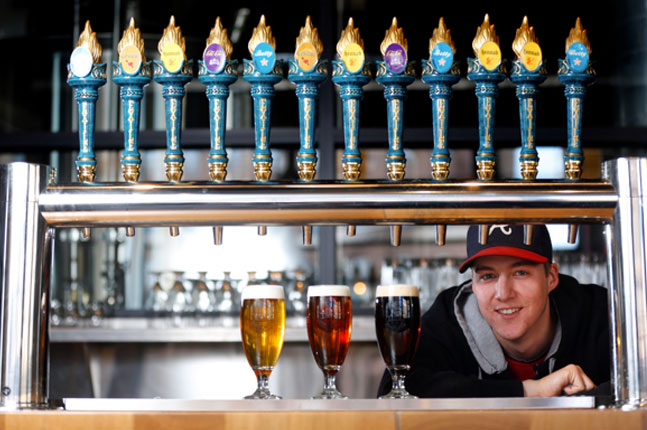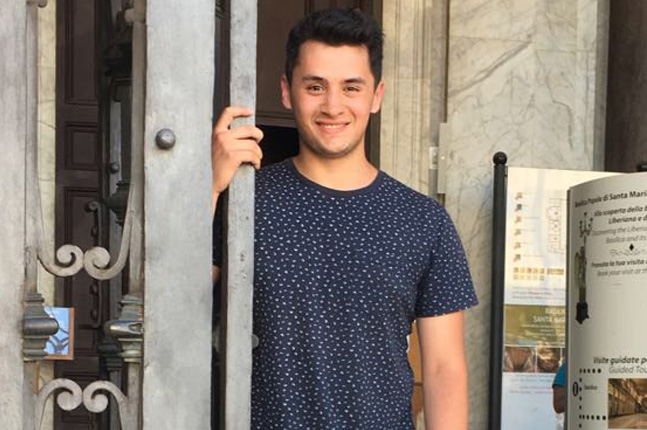A lot of college students come to like beer, but John Woodford remembers the semester when beer became his calling.
Woodford, then a senior, sat at his desk in a shabby apartment on Ames’ Lincoln Way one Wednesday night in 2010. Before the chemistry major was a stack of research papers. Ahead of him, the next morning, was yet another day filled with hour after hour of lab work on campus. It was enough to make any student — even one like Woodford, good at chemistry with ideas of a doctorate — need a drink.
Between sips that night of Flying Dog Pale Ale, a citrusy brew made in Maryland, Woodford had a revelation: This would be a fun thing to do.
So started a hops-led odyssey that took Woodford from central Iowa to a European brewing school and back. Now the 26-year-old uses his chemistry background and overseas training to craft Old World-style lagers at Exile Brewing Company, a Des Moines brewpub that’s moving into the bottled market.
Woodford calls it the Stainless Steel Forest. The brewery space at Exile’s downtown location hosts nine towering metallic tanks for brewing, around which Woodford trudged in black rubber boots and a baseball cap one recent afternoon.
Often, running a brewery isn’t glamorous. It can mean long days and late nights spent moving grains, filling kegs and sopping up water that gets all over the floor.
As Exile’s only brewer, Woodford often spends his days in downtown’s industrial Western Gateway district, between the Stainless Steel Forest (in what used to be a soap factory) and his apartment across the street (in what used to be a plumbing factory).
Woodford doesn’t even drink beer every day, he said. Maybe he imbibes a 6-ounce taster at lunch or a pint or two at day’s end. Besides, who has the time? The brewery is busier than ever lately, Woodford said, as Exile prepares to make space in its building for bottling equipment that is set to arrive next month.
“Because if we’re bottling — we’re having some issues with capacity (of the tanks) right now,” he said. “It takes a long time for these lagers.”
About six weeks’ time, Woodford said, from grain to glass. Bottling Exile’s beers on top of brewing for in-house consumption means added coordination and time on Woodford’s part. On brewing days, he starts at 6 a.m., he said, and may not leave until 11 that night.
Woodford doesn’t wear a lab coat here, but he’s still a scientist by training, still obsessively concerned with quality control and making sure each beer comes out just right. Hannah and Gigi — Exile’s names for its Bavarian wheat and dark lager varieties — will for sure get bottled, he said, along with rotating seasonal beers of Woodford’s design, all in Exile’s European-influenced style.
“Most of the styles we’ve done, I’d never brewed before — almost all of them,” Woodford said. “But it’s kind of just brewing and brewing and brewing over and over again, these styles that we do.”
The methodical patience for exactness and repetition come from Woodford’s chemistry background at ISU. He both worked in labs for class credit and as an on-campus job, conducting test after test after test. He had a knack for it, even got published — in The Journal of Applied Polymer Science — but the thought of five more years to get his Ph.D. and enter academia proved too much.
With beer on the brain that senior semester, Woodford started looking at schools. A lot of popular programs in the U.S., like the one at U.C. Davis, had long waiting lists. An Omaha-based brewer recommended the renowned program at Heriot-Watt University in Edinburgh, Scotland. Woodford enrolled that fall.
It was a one-year program. The fall focused on distilling spirits and the spring on brewing beer. Woodford learned first the theory: how to mix grain with water, how to heat it to activate enzymes and break down carbohydrates, how the yeast feeds on sugars to make booze.
He then learned the practice, becoming lead brewer in a four-student thesis project in which they planned, brewed and put to market their own small-batch brew. “Anorak,” a tropical wheat beer produced with Stewart Brewing, eventually went out to shops and pubs from Edinburgh to London.
Over the course of that school year, Woodford got an e-mail from an old college buddy whose father worked in Des Moines. The Tursis — those Tursis, the family that owns one of Des Moines’ most successful Italian restaurants, Latin King — was looking for a brewer for a new brewpub endeavor.
Woodford expressed interest and later video- chatted with Latin King owner Robert Tursi and his son, R.J., who would be heading up the brewery.
Woodford’s classmates would end up at producers all over the map — from Dogfish Head Brewery in Delaware to Tieton Cider Works in Washington. But to be back in Des Moines — close to family in Omaha, close to old college friends from Ames and with an established business family — was too good to pass up.
“I was like, I will work my ass off and make this place work,” Woodford said. “Which is pretty much what you need to do in a brewery.
“You work a lot.”
The Tursis grilled Woodford in a series of interviews.
They eventually hired him, though, without ever having tasted so much as a drop of his beer. James Hudec, a brewing-industry veteran who designed Exile’s brewhouse and consulted its owners on its launch, helped with the decision.
“The school that he graduated from is pretty much the Harvard of beer institutes,” Hudec said. “My only reservation was that he’d never run a brewery before. He had tons of theoretical knowledge but a limited amount of practical experience.”
Woodford wasn’t fazed. He was willing to learn more.
When he arrived in Des Moines during the summer of 2012 he underwent an intensive, hands-on training program under Hudec, who quickly noticed the newbie’s scientific attention to detail and quality.
The Des Moines beer scene is on the up and up, Woodford said, so he doesn’t plan on leaving anytime soon.
Between craft-crazy bars like el Bait Shop and Zombie Burger and progressive brewers like 515 Brewing Company and Confluence Brewing, there’s a lot of drinking to look forward to. And Woodford’s downtown brewing is right in the middle of it all.
“I think he’s a great asset to the beer community in Des Moines,” Hudec said. “He’s the type of guy that if he ever made a bad batch of beer, he would dump it. And not everybody is like that.”





